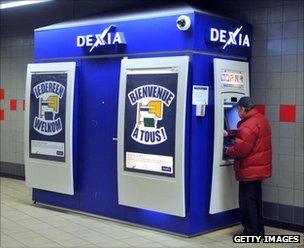Can we afford to heap bank losses on creditors?
- Published
- comments

Equity and debt markets haven't imploded today, but my goodness bankers are feeling jumpy.
Having spoken to a load of them, there is a presumption that something bad and inescapable is round the next corner.
What is causing this unease is four things:
that Dexia, the Belgian/French bank, is in talks to be rescued and reconstructed - just weeks after passing European regulators' health tests (the vaunted "stress" tests) with flying colours;
that the price of insuring Morgan Stanley's debt in the credit default swap (CDS) market has ballooned to a premium we haven't seen since the giddy days of the 2008 banking crisis;
that the rhetoric of governments is that banks must be allowed to fail, and bank creditors must incur losses in bank rescues;
that the eurozone shows no sign of being able to make rapid, bold decisions on adequate evasive action.
Point 4) is boringly well known, and has been discussed here many times, so let's take it as read (though history might ultimately prove that messrs Merkel, Sarkozy and Trichet can reincarnate themselves as International Rescue).
Let's elucidate the rest.
Joke
On Dexia, it was only on July 15 that the European Banking Authority disclosed that this retail and public-sector finance bank would have a ratio of core Tier One capital to assets of 10.4%, even after incurring notional losses from harsh simulated financial and economic conditions.
To translate: this portrayed Dexia as one of the strongest banks in Europe, because it meant Dexia was deemed by regulators to have more than twice the amount of capital it needs to absorb losses.
Which is perceived today by investors as something of a joke, in that the cost of insuring Dexia's subordinate debt implies that providers of this subordinated debt are facing losses of 35%.
Some would say the market regards Dexia - a bank with €578bn (£494bn) of assets and liabilities - as challenged from a solvency perspective. Which is presumably why Dexia is apparently going to be broken up and recapitalised.
The important point about Dexia is that its current difficulties tend to undermine confidence in the famous European stress tests, the recently completed Europe-wide process of verifying that the region's banks are tickety boo.
Domino
So since we're talking about investors and creditors confidence, or rather lack of confidence, it is remarkable that the cost of insuring Morgan Stanley's debt should be as high $528,000 for every $10m of its debt - which is incredibly high for a bank of Morgan Stanley size and reputation.
And creditors' wariness seems all the odder, given that Morgan Stanley has a chunky $182bn of liquid assets, twice the amount cash reserves as a proportion of assets that it held in the dark days of 2008.
And it also has almost 10% Tier One capital under the more demanding Basel lll definition, that won't be enforced till 2018 (if you haven't the faintest idea what I'm banging on about, just take it for granted that this is supposed to mean that Morgan Stanley is solid).
Why are creditors so anxious about Morgan Stanley?
It's probably nothing much more sophisticated than that Morgan Stanley is the investment bank that only just survived as an independent after Lehman imploded - so it will be seen as the next domino to fall (on the assumption that any big dominos fall this time).
That may not sound as though investors and creditors are in a terribly rational frame of mind.
Paradox
Even so, it is reasonable for investors and creditors to take at face value the pronouncements of G20 government heads that next time banks get into difficulties, there must be more "equitable" sharing of burdens between taxpayers and creditors.
That in effect means "more losses for creditors".
And who can say that's wrong, in ethical terms, given that bankers pay themselves as though they are proper commercial organisations, rather than semi-nationalised ones?
But there is a catch.
When the world is as jittery as it is today, and if taxpayer bailouts are to be consigned to the dustbin of history, it is probably understandable that investors and creditors will shy away from any institution that looks a bit more vulnerable to collapse, even if that vulnerability to collapse is marginal.
So we live in a time of paradox, such that governments' understandable desire to shelter taxpayers from bank losses is increasing the fragility of the banking system at this juncture - and making it more likely that the banking crisis of 2008 will rise from the dead to haunt us as a renewed financial and economic horror.